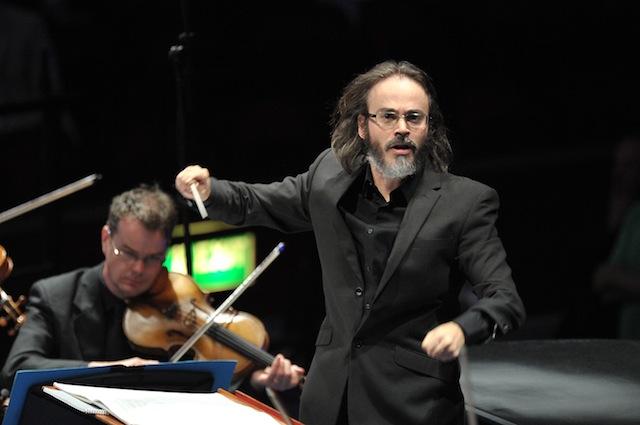Standing in the Albert Hall arena, critics’ notepad in hand, I felt rather like PC Plod taking notes at a crime scene. Only there was no serious crime to report in this engaging late-night Prom by the BBC Scottish Symphony Orchestra and its former Principal Conductor, Ilan Volkov – the ideal man to conduct music that isn’t by Brahms or Schubert.
He took charge, you may remember, of the Proms’ epic John Cage circus last year, and the composers corralled into this endeavour could be counted among Cage’s many friends and children. From America we heard from Morton Feldman and Frederic Rzewski; from England, John White; from Ireland, Gerald Barry: all composers of diverse quirks, though linked by the itch to experiment and a quizzical attitude, you might say, to classical music’s forms and history. On Sunday night, the same BBC orchestra had puffed and sweated through an intricate soundscape slab by Matthias Pintscher, on the whole as enjoyable an experience as clinging to a brick wall by your nails. Monday’s concert, by contrast, only brought some mild head scratchings, along with much humorous pleasure and, in Feldman’s numinous Coptic Light, rapturous peace of mind.
Little motifs were chewed and chewed, the way a dog chews a favourite boneThe programme’s progression cunningly followed a curve, from music of simple, hard outlines to complex dappled fuzz. John White’s Chord-Breaking Machine of 1971 – one of the numerous “machines” composed by this larkish member of Britain’s new experimental music scene of the time – kicked us off with ten joyful minutes of simple intervals, fourths and fifths, jiggled around, slowly rising in pitch, slightly blurred at the edges by gentle percussive taps and thuds. Fondly remembered from Brian Eno’s Obscure LPs of the 1970s, White bounced beaming onto the stage at the end – the beam of someone whose cryptic, ticklesome music usually never gets heard in a mainstream forum. It’s our loss as well as his.
On next to Irish mischief-maker Gerald Barry’s No other people, a work dated 2008, though some of its banal repetitions could easily have been snipped from Satie’s output in the 1920s. A brass figure rocked; strings stabbed and scurried; little motifs were chewed and chewed, the way a dog chews a favourite bone. Knowing that Barry’s title came from esoteric French writer Raymond Roussel’s written instructions to the commercial illustrator Henri-Achille Zo didn’t really aid navigation through the piece. But who could possibly flounder, anyway, in Barry’s piquant orchestral puzzle? Not Volkov; not the orchestra; not me.
Serious head scratching only occurred during the quicksilver, featherweight Piano Concerto imaginatively commissioned by the BBC from another experimental stalwart, Frederic Rzewski, who played the solo part himself. Where was this music going? In twenty different directions, it seemed. Piano whispers and twangs jostled across four pocket movements with melodic filigree, a manful cadenza, and little remnants of 1920s Copland, with every diversion cast against a light-textured, modest orchestra. A playful and mellow creation, this, from someone who’s jumped through so many musical hoops – minimalist, improvisatory, Beethovenian, the politically engaged – but always stays lively and unique. What other piano concerto do you know that ends with a swoop from a musical saw?
Casually dressed, stripped of ego, Rzewski never took a formal bow at the end, though he did give us a few nods of the head. No bow from Morton Feldman, either; being dead, it would be rather difficult. But his spirit lived on in the musical tapestry of his 1986 marvel Coptic Light, despatched with tender care, patience and a constant pianissimo by a conductor and orchestra who never flinched over a very meditative half an hour.
Coptic-era textiles in the Louvre gave Feldman his inspiration, though the result is more like watching clouds roll by: chords slowly morphing, textures mutating, everything drifting towards no obvious end. Within the fuzz, Volkov discreetly highlighted many hidden beauties: little upward arpeggios, for instance, delicate as petals opening; delicate woodwind chords that could have been generated by some vast celestial organ. Upon this magic the clunk of a punter’s plastic bottle toppling onto the arena floor was a jarring intrusion. But at least I now have a crime to report.














Comments
Add comment